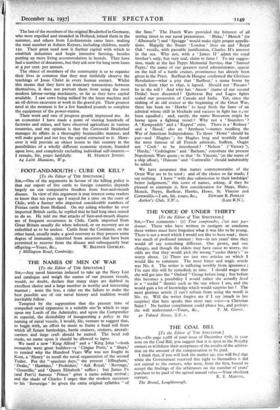THE .NAMES OF MEN OF WAR - [To the Editor
of THE SPECTATOR.] Sm,—Any naval historian induced to take up the Navy List and catalogue and weigh the names of our present vessels, would, no doubt, declare that many ships are dubbed in excellent choice and a. large number in worthy and interesting manner ; none the less, a rider on the failure to make the best possible use of our naval history and tradition would inevitably follow.
Tempted by the' supposition that the present time of compelled naval expansion is a suitable one 'in which to urge Upon my Lordi of she :Adniiialty, and upon the Comptroller in especial, the desirability of inaugurating a policy in the - naming of naval vessels, I would, Sir, venture to suggest that, to begjn. with, an effort be made to frame a bead roll from • which all, future hattleihips, battle cruisers, cruisers, aircraft- carriers and large craft shotild be named. The bead roll made, no name upon it should be allowed- to lapse. - We need a. new A King Alfred ' and a King John '—both monarchs were great. buildersa Cingue Ports.; a Sluys,' to remind why the- Hundred Years War was not fought in Kent, a Henry ' to recall the naval organisation of the second TUdor. For the " spacious days," the present Effmgham,' Drake,' Hattkins,' • Frobisher,' • Ark Royal,' Revenge,' Grenville,' add Queen Elikabeth sufflce ; but James I's (and Pett's) 'fan:mug Prince' • gives •a name asking -revival ; and the shade of -Charles I urgei that, the modem successor to his 'Sovereign' be the extra original syllables " of the Seas." The Dutch Wars provided the' bitterest of all testing times to our naval pretensions. Blake," Monck ' (or Albemarle ') and Spragge ' would make right proper appella- tions." Happily the Stuart London ' lives on and Royal Oak' recalls, with passable justification, Charles II's interest 'in the sea. Why not, with a James II ' admit the royal brother's only, but very real, claim to fame ? To my sugges- tion, made at the last Pepys Memorial Service, that Samuel Pepys,' the name of our greatest naval administrator, appear on the hull of a battle cruiser, prominence has already been given in the Press. Barfleur-la Hougue confirmed the Glorious Revolution—what a pity that Barfleur,' a name borne by vessels from' 1697 to 1892, is lapsed. Should not Passaro ' be in the roll ? And why has Anson ' (name of our second Drake) been discarded ? Quiberon Bay and Lagos fights sealed our possession of Canada and India. Yet, since the sinking of an old cruiser at the beginning of the Great War, there has been no Hawke' to keep fresh the fame of an admiral whose skill in blockade and success in fight has n .ver been equalled ; and, surely, the name Boscawen might be borne upon a fighting vessel ? Why not a Saunders ' ? A Kempenfelt ' and a Keppel ' exist. There is a Rodney ' and a Hood,' also an Arethusa '—names recalling the War of American Independence. To those Howe ' should be put—and Hughes ' ; for Hughes long and worthily faced 'the most famous of all French admirals, Suffren.' Ought not Cook ' to be introduced ? Nelson ' (` Victory '), Hardy," Codrington ' and Barham,' constitute the present Napoleonic Wars quota ; to that St. Vincent,' (as the name of a ship afloat), Duncan ' and Cornwallis ' should indubitably be added.
We have assurance that names commemorative of the Great War are to be used ; and of the choice so far made, I say nothing. I leave "with due submission to their lordships' better judgement," this score of names, asking, if they be pleased to entertain it, first consideration for Sluys, Blake, Monck, Pepys, Barfleur, Hawke, Howe, St. Vincent and Comwallis.—I am, Sir, yours, &c., EDWARD B. POWLEY Author's. Club, .S.W.r. (Late R.N.),


































 Previous page
Previous page